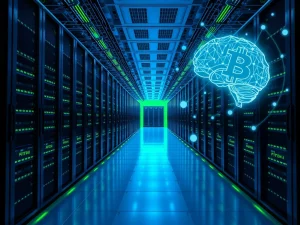Urgent Threat: AI Data Monopolies Imperil Crypto’s Decentralized Future

The cryptocurrency world often focuses on internal debates. Yet, a much larger, more critical battle unfolds elsewhere. While crypto debates DeFi forks, AI companies quietly build vast AI data monopolies. These monopolies are unprecedented in scale and control. They threaten the very foundation of decentralization that crypto champions. This article explores this growing danger and highlights the urgent need for a strategic shift within the crypto industry.
The Alarming Rise of AI Data Monopolies
For a decade, the crypto industry championed decentralization. Bitcoin aimed to decentralize money. Ethereum sought to decentralize computation. However, during this same period, AI companies quietly amassed immense power. They created the most valuable monopolies since Standard Oil. Significantly, these are data monopolies. They dwarf traditional protocol dominance by comparison.
The AI industry’s growth is staggering. Experts project over $300 billion in revenue by 2025. This revenue primarily comes from training models. These models use trillions of data tokens. They scrape this data from researchers, writers, and domain experts globally. Meanwhile, crypto communities debated minor technicalities. Bitcoin maxis fought block size wars. Ethereum proponents discussed MEV extraction. Major AI players like OpenAI, Google, and Anthropic executed a different strategy. They scraped the entire corpus of human knowledge. They then locked it inside proprietary training runs. This created formidable moats. No amount of capital or talent can easily overcome these.
The crypto industry’s response has been underwhelming. It often launches yet another DeFi fork. However, the most consequential infrastructure battle of our era happens off-chain. Crypto needs a profound wake-up call. It is catastrophically misallocating its attention. AI companies perfect centralized control over intelligence itself. This represents the ultimate network effect. It makes liquidity pools seem like child’s play.
Understanding Decentralized Data Ownership and Its Absence
DeFi proved that financial infrastructure could be rebuilt transparently. However, financial rails are commoditized. Knowledge monopolies are far more complex. Every DeFi protocol competes on execution, composability, and user experience. This is because underlying assets are standardized. Tokens, stablecoins, and liquidity are all portable. In stark contrast, AI data sets are not portable. They remain locked inside expensive training runs. These runs can cost $100 million and take months to complete. Once a foundation model reaches critical mass, replicating it becomes prohibitively expensive. The first mover who assembles the training corpus often wins permanently. This holds true unless new infrastructure fundamentally changes the rules.
Consider the established giants. Google boasts two decades of search query data. Meta possesses 15 years of social interaction data. OpenAI strategically partnered with publishers. These publishers will never license the same content to competitors. These are permanent moats. They compound with every new user interaction. Crypto successfully built decentralized alternatives to centralized finance. Yet, where is the decentralized alternative to centralized intelligence? It simply does not exist. This absence stems from crypto’s failure to treat decentralized data ownership as an existential fight. It has not been a priority worth having.
The Urgency for Crypto Innovation Beyond Speculation
The harsh truth is that data set infrastructure often seems less exciting than yield farming. Crypto founders frequently chase token velocity. They seek speculative upside and viral growth mechanics. Building attribution layers for training data offers little immediate speculation. It requires years of dedicated ecosystem development. Furthermore, it demands partnerships with slow-moving institutions. However, ‘boring’ infrastructure is precisely what truly mattered historically. Ethereum, for instance, was not exciting at its launch. It functioned as a slow, expensive computer. Academics primarily appreciated its potential. Similarly, Chainlink was not thrilling. It served as an oracle network. It took five years to gain widespread adoption. The most critical crypto infrastructure often resembled homework. It stood in contrast to the nearby casino. Today, data set attribution protocols are the essential homework.
The market opportunity for these protocols is vast. It surpasses that of DeFi. Their network effects are more potent than any protocol token. Moreover, increasing regulatory pressure creates inevitable demand. Despite this, crypto capital continues to flow into the next NFT marketplace. It largely ignores the infrastructure that could prevent AI companies from becoming more powerful than nation-states. This lack of strategic crypto innovation poses a significant risk to the industry’s long-term relevance.
Building Robust Blockchain Infrastructure for Data Attribution
AI companies are not waiting for permission. They are actively training their next-generation models. GPT-5, Claude 4, and Gemini Ultra are all in development. These models use data scraped from millions of creators. These creators will likely never receive compensation. Every training run that completes without on-chain attribution strengthens centralized control. Once these models achieve sufficient capability, they become self-reinforcing. Users generate new data through interactions. This data then trains the next model version. The next version, in turn, attracts even more users. This flywheel accelerates rapidly. Competitors cannot catch up. They lack both the initial data corpus and the ongoing data stream. Crypto has a narrow window, perhaps two years, before this opportunity closes permanently. After this point, blockchain infrastructure may struggle to dislodge established data set monopolies. They will become facts of nature.
Instead of merely building more DEXs, the crypto industry needs to pivot. It requires data set registries. Contributors would cryptographically sign data licenses before any training begins. It also needs attribution protocols. These protocols would log which data sets influenced specific model outputs. Micropayment rails are also essential. They would automatically split inference revenue among original creators. Furthermore, reputation systems are necessary. These systems would rank data set quality based on measured model performance, not subjective metrics. The underlying technology is simpler than most DeFi protocols. Data set registration involves:
- Cryptographic hashes
- Contributor wallet addresses
- Standardized licensing terms
- Usage logs
Training runs would record the data used and its usage time. Inference requests would then route payments proportionally to registered contributors. This infrastructure does not require new consensus mechanisms. It also avoids experimental cryptography. It primarily needs builders. These builders must prioritize preventing monopolies over chasing liquidity rewards.
Safeguarding the Future of AI: Crypto’s Ultimate Mission
Crypto’s founding thesis was clear: prevent centralized control over valuable networks. Bitcoin aimed to prevent central banks from monopolizing money. Ethereum sought to prevent tech companies from monopolizing computation. However, if AI companies monopolize intelligence, these past victories become irrelevant. What good is decentralized money if centralized models control public thought? What good is decentralized computation if centralized training data determines which ideas get amplified? Intelligence sits upstream of everything. This includes finance, governance, media, and education. Whoever controls AI training data controls the future information environment. Crypto faces a stark choice. It can build the infrastructure to make data set monopolies impossible. Alternatively, it can watch AI companies perfect the exact centralized control that blockchain was invented to prevent. There is no third option. Crypto cannot remain focused solely on token speculation and stay relevant. This is the most significant technological shift of the century. The industry must build data set attribution infrastructure now. Otherwise, it will write its own obituary. It will be remembered as the movement that preached decentralization. Meanwhile, centralized AI companies built permanent monopolies on human knowledge. This is the ultimate test for the future of AI and crypto’s role within it.








